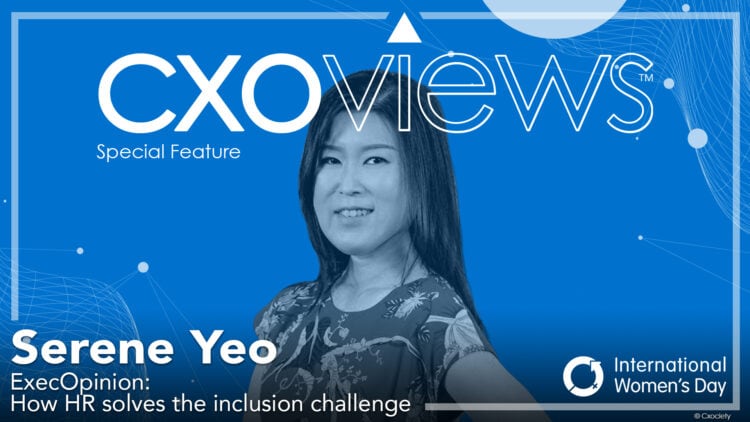Inclusion is defined as the practice or policy of providing equal access to opportunities and resources for people who might otherwise be excluded or marginalized. But it goes beyond the ability to join an organisation and encompasses the fostering of an environment where everyone feels respected and valued regardless of their background and identity.
The starting point of any inclusion culture is at the point when an organisation lists down the specifics of a job or role in the organisation. It is at this point when bias creeps into the hiring process such as hard and soft qualifications, ability to work under specific conditions, etc.
At a time when nearly every industry faces a talent shortage following the COVID-19 pandemic, it is interesting to observe that aspirations to inclusion remain a challenge – albeit less insurmountable compared to perhaps a decade ago.
FutureIoT and FutureCOO spoke to Serene Yeo, vice president for human resources at Ensign InfoSecurity (Ensign) for her take on the challenges and opportunities of broadening the doors to talent regardless of ethnicity or gender.
The talent shortage exists at all functions and across most industries. There is no shortage of graduates in educational institutions. Where is the disconnect here?
Serene Yeo: In my view, it is due to the following factors:
One – Skills mismatch.

As technology evolves, so do the skills that employers seek. There is a mismatch between the skills that are sought by employers and the skills that are possessed by individuals.
For example, as cyber threats continue to evolve in sophistication and scale, cyber defenders need to evolve accordingly, giving rise to new cybersecurity roles such as malware researchers and big data engineers.
Events such as the COVID-19 pandemic can also have an immediate impact on the demand for certain skills. There was a surge in demand for technical and digital skills to support digitalization and the shift to remote work.
Two – Expectations mismatch.
The aspirations, preferences and priorities of each generation of graduates evolve as well.
One generation may increasingly prioritize factors such as work-life balance, flexible work arrangements, and comprehensive benefits packages. However, employers may not always be able to meet these expectations due to operational requirements or cost considerations.
Eg 2. Remote work and flexibility: The COVID-19 pandemic has shifted expectations around remote work and flexibility, with many job seekers seeking opportunities for remote or hybrid work arrangements. However, not all employers are able or willing to offer remote work options, leading to mismatches between what job seekers desire and what employers can provide.
At Ensign InfoSecurity, we have initiatives and programmes that engender a growth mindset and foster a culture that supports and celebrates lifelong learning. We also provide resources to empower our employees with the flexibility to determine their own path, learn at their own pace, and take ownership of their professional development.
To further invigorate on-demand learning, we gamified the process by creating a leaderboard highlighting the top learners each month. Based on 2023 results, Ensign has collectively spent 27,252 hours on this learning platform, with an 85.1% active rate!
We also provide a variety of opportunities for learning and exposure, including participating in overseas conferences such as the RSA Conference, and training courses from reputable accredited vendors such as SANS Institute and Amazon Web Services (AWS).
Given the niche intersectionality of the work that Ensign does, standard courses may not always adequately address the needed areas for skill development. Our Ensign subject matter experts tailor trainings that address specific skill gaps and knowledge needed for productivity improvement and transformation within the organisation.
Ensign has also sent a cohort of our employees back to school on a Work-Learn Degree Programme with SIT. Through this, we support our employees’ aspiration to deepen and broaden their skills and earn a cybersecurity degree while gainfully employed. They are expected to graduate in 2025.
You’ve been in the talent management practice for at least two decades, including a year specifically on diversity and inclusion. Coincidentally, the IWD 2024 theme is Inspire Inclusion – to inspire others to understand and value women's inclusion, we forge a better world. What is your view on this?
Serene Yeo: Is this a tall order given the many challenges and issues already facing humanity (climate change, poverty, socio-economic volatility, etc.)?
"In today’s digital age, technology services are consumed by people of all genders. Having women actively involved in technology development ensures that technology caters to the needs of everyone, effectively addressing the diverse perspectives and preferences of consumers."
Serene Yeo
Diversity also fosters creativity and innovation. With more women in the workforce, they bring unique experiences and fresh ideas that enable companies to stay ahead of cyber adversaries.
At Ensign, we believe women can be game changers in the cybersecurity industry. This belief is translated and reflected in our workforce and the activities we embark on. Led by a female chief, around 1 in 3 is a female staff, cutting across job functions and leadership positions.
We also partner with associations and academic institutions to inspire young women to join the cybersecurity industry. This includes the Association of Information Security Professionals “Ladies in Cyber”, and the Work-Learn Degree program with the Singapore Institute of Technology.
What lessons can you share with (a) HR professionals, and (b) security professionals as regards finding success in their chosen fields/profession?
Serene Yeo: I view success as something deeply personal. Everyone defines success differently. Moreover, a person’s definition of success can evolve as life changes and as one goes through different stages of life.
For some, it may be achieving a high-ranking position or earning a substantial income. For others, it could mean finding meaning and purpose in their work, making a positive impact on others, or having more time with family. Receiving recognition from peers or opportunities for career growth and advancement may be measures of success for some.
To find success, you first have to look within yourself – Why do you do what you do? What is deeply satisfying to you?
"Understanding your motivations, values, and passions is crucial in charting a path towards meaningful success. By aligning your actions with your innermost desires and aspirations, you can unlock your full potential and find fulfilment in your endeavours. So, take the time to introspect, identify your purpose, and let it guide you on your journey towards achieving success."
Serene Yeo
For security professionals, I feel that success in cybersecurity is not just about achieving technical certifications but also making a meaningful impact. Being in cybersecurity, your work protects individuals and organisations in the digital age by staying ahead of evolving threats.
So, finding success means striking a balance between achieving qualifications and contributing to a safer environment. Find ways to remain passionate, such as being engaged in cybersecurity communities to reinvigorate your enthusiasm for your work or mentor others to reignite your passion, reminding yourself of the importance of your mission in safeguarding the digital world.



